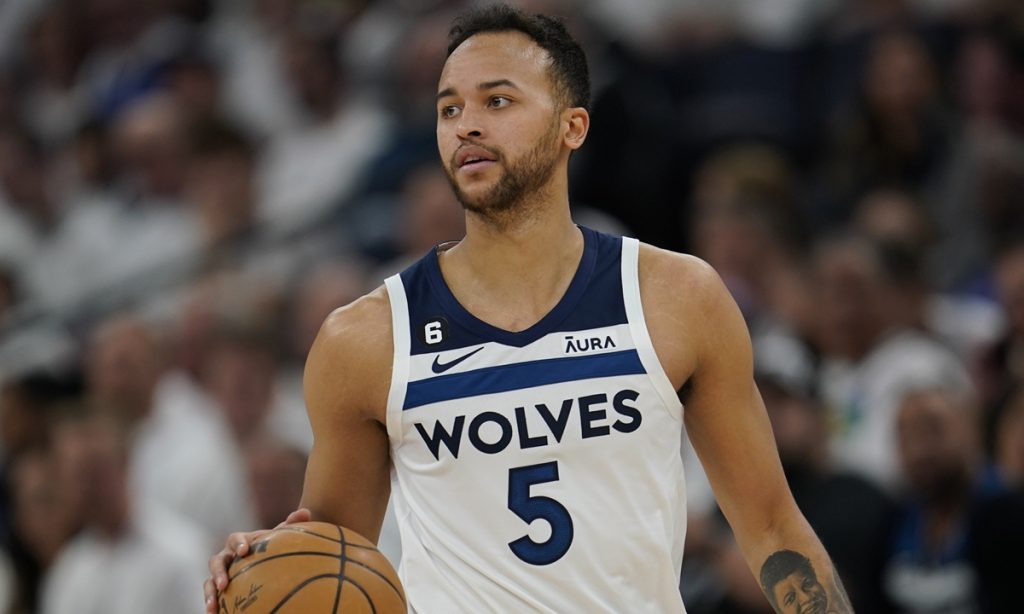NBA star now Chinese citizen

"I am so happy to announce that I will be representing China at the World Cup. I'm really proud and honored to wear the Team China jersey," Minnesota Timberwolves forward/guard Kyle Anderson, also known by his Chinese name Li Kai'er, said in a video on Chinese social media on Monday after he officially obtained Chinese nationality.
The 29-year-old, 2.06-meter-tall basketball elite from New York has been competing in the US National Basketball Association (NBA) ever since joining the league as a first-round pick in 2014. Li has now become the first player to have ever been naturalized in China's basketball history, making him now eligible to join Team China at the upcoming FIBA World Cup that tips off on August 25.
According to an official release from the Chinese Basketball Association (CBA), Yao Ming, the NBA hall of famer and incumbent CBA president, has met with Anderson to mark the milestone event.
Yao said that "the naturalization of Li Kai'er complies with Chinese laws and regulations and the relevant rules of the FIBA, and blood and cultural identity are important reasons for us to meet each other. Li will be the first naturalized player in the history of Chinese basketball. It is also an innovation for the system and exploration for us. During this process, we have received strong support from all parties. We are very grateful for that. Li is an outstanding player, and I believe him joining the team can help the Chinese men's basketball team."
Anderson has averaged 9.4 points, 5.3 rebounds and 4.9 assists in 68 games in 2023 for Minnesota as a playmaking forward in his ninth NBA season. He was added to the talent pool list for China's national basketball team on Monday, meaning that Anderson can now suit up and play for China immediately once recruited by the national team.
To show his excitement, Anderson posted a photo on his Instagram account on Monday of himself wearing a red No.5 Team China jersey for the 2023 World Cup, with a message that said, "About damn time! Let's go!"
"With the help and support of all parties in China, today I have fulfilled my will to recognize my ancestors and the greatest wish of my family!" Anderson said in a Sina Weibo post.
Anderson's great-grandfather was from Shenzhen, South China's Guangdong Province. In 2018, Anderson and his mother Suzanne Anderson visited Xinmu New Village in Shenzhen, to seek out their roots. Their Chinese relatives welcomed them with a firecracker show, traditional cultural experiences and a huge banquet.
In video footage of the trip, Anderson described it as "one of the best times and moments" of his life.
"It's weird to come to a place I've never been before, yet feel at home. I can't explain in words... I am so thankful and honored that these people would accept me and give me such a warm welcome," he told Shenzhen TV at the time.
During the trip, Anderson was given the Chinese name Li Kai'er by one of his elder Chinese cousins. To honor his playstyle, Chinese basketball fans have also given him the endearing nickname "Li Dachui," which means "a big hammer" that is slow in motion but effective with every strike.
According to FIBA rules, each national team can include only one naturalized player. That player must have obtained citizenship of the adopted home country after turning 16 and never have represented his or her native country internationally. Eligibility is subject to approval by FIBA's secretary-general.
Chinese basketball insiders reached by the Global Times applauded the naturalization of Anderson, saying it marks a new beginning for Chinese basketball, and adding that Anderson brings a lot including versatility and a high basketball IQ to Team China. They noted that Anderson will boost China's chances at the 2023 World Cup, where only the best-performing Asian team wins direct qualification for the Paris Olympics in 2024.
"Li Kai'er, who made his break in the NBA when he played for Gregg Popovich with the San Antonio Spurs, could be the missing piece for Team China. His ball-handling skills, game-making abilities and great understanding of team play could effectively help link Team China's strong centers and still young guards on the court," Wei Qi, a basketball commentator with the Beijing Radio and Television Network, told the Global Times on Monday.
Wei pointed out that it has been a world trend to naturalize foreign-born players, citing US-born South Korean basketball player Ra Gun-ah for Team South Korea. Team China has now joined the trend starting with Anderson.
His Chinese lineage, love for Chinese culture and willingness to contribute his basketball skills to Team China are the main factors that qualified him for the naturalization process. His participation will be an example of win-win cooperation, Wei noted.
Anderson has joined a glittering cast of naturalized athletes who have chosen to suit up for China. They include California-born Olympic champion freestyle skier Gu Ailing, Canadian-born ice hockey player Brandon Yip and, most recently, Hungarian-born short-track speed skating brothers Sandor Liu Shaolin and Liu Shaoang. All of them have been hailed by Chinese fans.